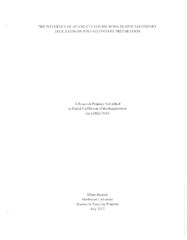The Influence of AP and CTE Coursework During Secondary Education on Post-Secondary Preparation
Abstract
During secondary education, students are encouraged to pursue a variety of pathways within the post-secondary environment, but most often the pressure is to attend university. The following investigation was centered on two types of preparative coursework available within the secondary environment, AP and CTE classes, and how students as well as teachers felt that the classes in each category helped or would help within the post-secondary environment. Both AP and CTE instructors were interviewed as well as students who had participated in such coursework. Students with an AP focus tended to view CTE coursework as not as important as AP in their preparation for the post-secondary because their ultimate goals were four-year university or higher. The CTE student interviewed thought of his time in CTE as the foundation for his current career and post-secondary pathway within the Culinary Institute of America. Both instructors interviewed believed that the ultimate goal of their coursework was to prepare their students for the particular path they chose. The CTE instructor thought that the opportunity to experience and the value of hands-on career training were often overlooked and undervalued based on her communications with students already within the post-secondary environment. In conclusion, the benefit of CTE courses can often be overlooked in favor of courses that are specifically designed for college or university preparation in an environment where pressure to attend university is high. However, for those students and instructors involved in CTE, the skills and knowledge obtained within CTE courses can be extremely useful in deciding intended post-secondary pathways, not only in regards to higher education choices, but ultimate career and life goals.
Original item type
PDF
Original extent
iii, 38 pages
Subject
Copyright
This original work is protected by copyright. Copyright is retained by the author(s). Works may be viewed, downloaded, or printed, but not reproduced or distributed without author(s) permission.


 Maintained by the Northwest University Library
Maintained by the Northwest University Library